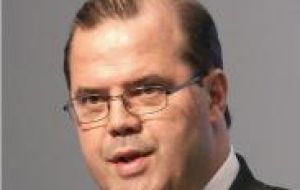MercoPress. South Atlantic News Agency
Brazilian central bank raises benchmark rate 0.25 percentage points to 12%
 Alexandre Tombini, chairman of the central bank: two votes wanted a 0.5% hike
Alexandre Tombini, chairman of the central bank: two votes wanted a 0.5% hike Brazil’s central bank raised its benchmark interest rates a quarter of a percentage point from 11.75% to 12%. The decision surprised the market since it was a smaller raise than two previous hikes of half a percentage point earlier this year.
The Central bank release said that “following the process of adjustment of monetary conditions, the Copom decided to raise the Selic rate to 12% a year, without a bias, with five votes in favour, and two votes in favour of raising the rate 0.5 percentage point.
“Taking into account the balance of inflation risks, the still uncertain rhythm of the moderation of domestic activity, as well as the complexity of the international environment, the committee understands that, at the moment, the implementation of adjustment in monetary conditions for a sufficiently long period is the most adequate strategy to guarantee the convergence of inflation to the target in 2012.”
Fast rising inflation, pushed in part by soaring global food and fuel prices, has put Brazil's new central bank President Alexandre Tombini in the difficult predicament of seeking to balance the country's need to fight price rises with a desire to avoid hampering Brazil's extraordinary growth story by pushing rates even higher.
The dilemma is set against real questions about how effective local interest rates are in fighting inflation caused by global trends like soaring food and fuel prices.
What's driving concern is that an already tricky inflation scenario worsened in recent days. Brazil said Wednesday that its benchmark inflation rate, which is broadly similar to the U.S. consumer price index, quickened to 6.44%--its fastest rate in more than two years. Meantime, central bank surveys say that inflation expectations are Brazilians are deteriorating.
And Brazil's decision on how much to raise rates is complicated by its other big macro economic headache: An overvalued currency.
Like some other emerging market countries, Brazil is letting its currency appreciate in order to stem inflation. But the Brazilian Real has already soared around 40% since early 2009 as global investors pour money into the financial system to profit--at least in part--from Brazil's high interest rates.
Brazilian businesses are grumbling that the strong currency is making them vulnerable to competition from countries with weaker currencies, particularly manufactured goods from China.




Top Comments
Disclaimer & comment rulesCommenting for this story is now closed.
If you have a Facebook account, become a fan and comment on our Facebook Page!